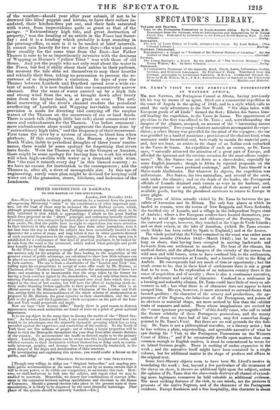PROPER DISTRIBUTION OF RAILWAYS.
TO THE EDITOR OF THE SPECTATOR.
London,18th December 1845.
SIR—Were it possible to divert public attention for a moment from the present all-engrossing Ministerial " crisis " to the consideration of other important mat- ters not the least of these may be reckoned the new Railway system, which,
although propounded during the last Parliamentary session, is only about to be fully exhibited in that which is approaching: I allude to the great leading trunk-lines projected on the " direct" principle, and embracing laterally districts of country more or less extensive by branch-lines or other adventitious connexions. lam aware, Sir, that the public have no right to expect from you more attention to their interests in this matter than they have from other journalists, were it not that from the way in which the subject has been occasionally treated in the Spectator for a series of years, and long before it was in other quarters deemed of such essential importance to the country, something like a claim upon you is established for a continuance of that kind of practical guidance, to be looked for in vain from the venal or the interested, unless indeed when principle and profit may happily go hand-in-hand.
In the Times of this morning a couple of advertisements appear, which to any one anxious only for the adoption of the lines leading to the acquisition of the greatest extent of public advantage, are calculated to show how little reliance can be placed on mere public opinion, and those on whose dicta it is generally founded in such matters. The one is from a shareholder of the "London and York" line, calling upon his co-proprietors to accept of some offer made by Mr. Hudson, as Chairman of the "Eastern Counties" line, towards the amalgamation of these Iwo lines; and assuming it as incontestable that the steps taken by the former for having a fresh contract signed by the shareholders, will not only debar them from entering Parliament on the same vantage-ground over rival lines which they oc- cupied at the close of last session, but will have the effect of excluding them en- tirely under Standing Orders applicable to their peculiar case. The other is an official answer to Mr. Hudson's offer by the Chairman of the London and York line, setting forth the unreasonableness of the whole scheme of amalgamation as proposed by Mr. Hudson, the great injustice to their shareholders, and the bad faith to the public and the Legislature, which acceptance on the part of the Lon- don and York would perpetrate and imply. Now see here "how doctors differ.' Surely there is good reason to distrust appearances when such authorities are found at issue on a point of great national importance. It is not my object in the mean time to discuss the merits of the "Direct Sys- tem." As between London and York, I can readily see and comprehend how vast would be its advantages over the miserable rigmarole grouping which has so long prevailed against the experience and convictions of the country. To the North of York there are five millions of people, out of whom, a larger proportion will be found to visit the Metropolis throughout the year than from other remote districts of the country. To accommodate the traffic so derived ought to be the primary object. Laterally, the population can be swept into this longitudinal vortex, and whirled onwards to their destination without obstruction or delay such as contin- ually interrupt, perplex, and derange lines less systematically conducted, to the great danger of the lieges and deterioration of their interests. By investigating and explaining this system, you would confer a favour on the public, and oblige AN ORIGIIeAL SUBSCRIBER OF THE SPECTATOR.
[Though very willing to oblige our " Original Subscriber," and mayhap pro- mote public accommodation at the same time, we are by no means certain that it will be in our power, or lie within our competency, to undertake this task. How- ever, we shall endeavour to look into the subject, and report what we may be enabled to ascertain. Meanwhile, we descry new combinations of corrupt influ- ences in the connexion between railway speculations and elections to the House of Commons. Should a general election take place in the present state of these speculations, it is likely to be disgraced by the most shameful barterings. That phase of the system should be narrowly watched.—En.]


























 Previous page
Previous page